Some best-selling physicists really dislike philosophy and see it as a complete waste of time. Is this largely down to the very-simple fact that philosophy isn’t… well, physics?
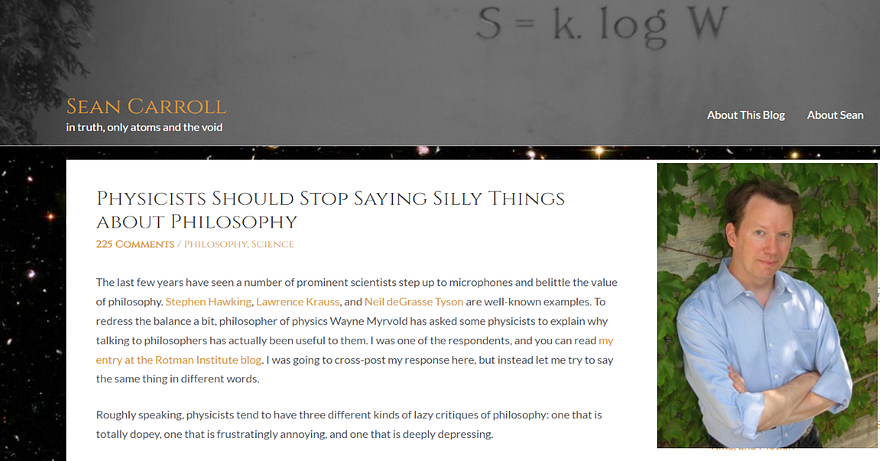
Some physicists (especially the ones who write best-selling books) have a big problem with philosophy. That problem is that they don’t like the fact that philosophy isn’t physics.
Of course they never put it quite so simply or honestly.
And, yes, such physicists have also given reasons for their anti-philosophy stances. Indeed a handful of the reasons they’ve given are subtle. However, most are crude and ignorant…
Yet it’s still essentially all down to philosophy not being physics.
The claims above may themselves seem as simplistic as the anti-philosophy positions of the aforementioned physicists. However, if you read the actual words of these physicists on this issue, then you’ll quickly note the lack of names of any actual philosophers or any details about what they argue.
The anti-philosophy physicists’ other big problem (which, of course, follows from their main big problem) is that philosophers aren’t physicists.
Philosophers Aren’t Physicists
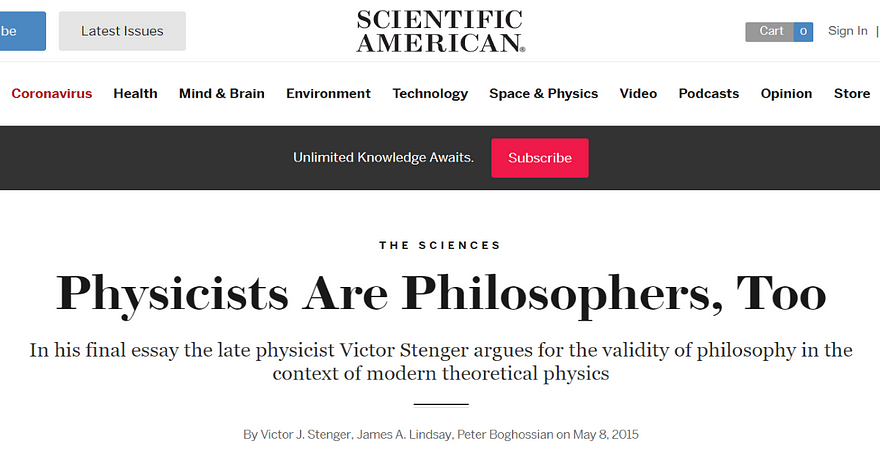
One can guess (i.e., from the overall context) that the claims of anti-philosophy physicists basically amount to the fact that (most? all?) philosophers don’t understand the mathematics of physics and all the precise technical details involved in physical theories.
To put it more simply. Anti-philosophy physicists are basically saying that philosophers don’t know as much about physics as they do.
Of course no single physicist knows all the maths and all the technical details of physics either. Indeed most physicists have extremely narrow specialisms.
In addition, if philosophers knew as much about physics as physicists do, then they’d probably actually be physicists.
So it can be argued that such anti-philosophy physicists are replicating sociologist Steve Fuller’s own position against… physicists and biologists. (Specifically, against Murray Gell-Mann, Roger Penrose, Steven Jay Gould, etc.)
Steve Fuller’s basic problem (at least as I see it) is that physicists and biologists aren’t as emersed in sociology (or the social sciences generally) as he is.
Fuller wrote the following:
“[T]o a sociologist, it will be apparent that many of the ‘deep puzzles’ that these scientists brood over could be solved, or at least dissipated, by a dose of social science [].”
So that can be rewritten in this way:
To a physicist, it will be apparent that many of the ‘deep puzzles’ that these philosophers brood over could be solved, or at least dissipated, by a dose of physics and science generally.
Indeed some physicists have said precisely that!
Fuller also stated this:
“[T]he most disturbing feature of these interviews is that despite their interdisciplinary pretensions, none of the scientists ever feels the need to refer to theories or findings of the social sciences (except for a few derogatory remarks about economists). When [Steven Jay] Gould wants to flaunt his well-roundedness, he quotes Horace and Shakespeare, not Marx and Weber [].”
This can also be rewritten as follows:
The most disturbing feature of philosophers is that none of them ever feels the need to refer to the theories or findings of physics (except for a few derogatory remarks about [this is my addition] the lack of philosophical sophistication of physicists).
So Fuller himself is (if implicitly) asking his readers why biologists and physicists aren’t as immersed in sociology as he is. And anti-philosophy physicists are (more explicitly) asking their readers why philosophers aren’t as immersed in physics as they are.
In terms of Steve Fuller’s stance.
If physicists were as immersed in sociology as Fuller himself is, then they’d basically be sociologists.
In more detail.
Fuller mentioned various artfully-selected theories which his targeted biologists and physicists didn’t themselves mention or didn’t know anything about. And then Fuller went on to simply assume ignorance on the part of his targeted scientists for not knowing — or simply mentioning — these things…
So doesn’t that sound familiar?
It can now be said that there’ll be many other (relevant) things which these biologists and physicists know (or knew), and which Fuller himself doesn’t know. So perhaps such scientists show now repay the compliment and arbitrarily namedrop the theories and ideas which Fuller himself doesn’t know.
And that’s what anti-philosophy physicists sometimes do when criticising philosophy. (“You comment on physics, yet you haven’t mastered differential geometry, multilinear algebra, manifold theory and functional analysis!”)
To change tack a little.
A YouTube video called ‘Scientists vs Philosophers’ opens up with the host (a Steve Paulson) asking this question:
“Why is it that so many physicists are bashing philosophers nowadays?”
So now let’s single out the well-known case of Stephen Hawking.
Stephen Hawking
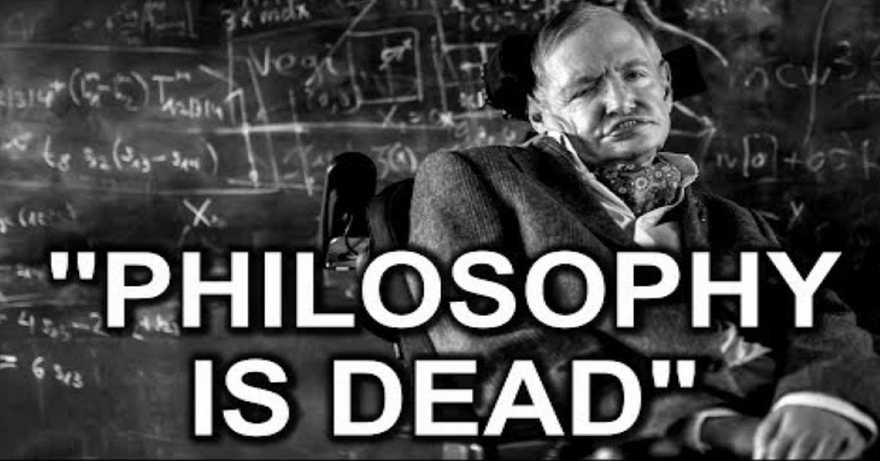
Stephen Hawking one stated that “philosophers haven’t kept up with physics”. Indeed (in his book The Grand Design) Hawking went into more detail in the following passage:
“Traditionally these are questions for philosophy, but philosophy is dead. Philosophy has not kept up with modern developments in science, particularly physics. Scientists have become the bearers of the torch of discovery in our quest for knowledge.”
Stephen Hawking is actually both a bad and an ironic example of an anti-philosopher. That’s for the simple reason that what he said about philosophy is very naive. That’s the bad part. More ironically, Hawking offered the world his very own philosophical position on physics, which he called model-dependent realism. Indeed Hawking even borrowed a technical term from philosophy — “realism”.
(“Realism” isn’t a term of — or in — any branch of physics I know. However, it is sometimes used in the interpretations of quantum mechanics.)
Now how bizarre is all that?
So here’s a taster of Hawking’s very own philosophy:
“There is no picture- or theory-independent concept of reality. Instead we will adopt a view that we will call model-dependent realism: the idea that a physical theory or world picture is a model (generally of a mathematical nature) and a set of rules that connect the elements of the model to observations. This provides a framework with which to interpret modern science.”
Sure, it might have been the case that Hawking didn’t see his model-dependent realism as a philosophical position. He might have seen it as, say, a simple description of “the facts” or a description of the methodologies of physics. Yet that too would have been very naïve.
In addition, since Hawking classed himself as “a positivist” on more than one occasion, then his complete rejection of philosophy was even more ridiculous and naïve that so far characterised.
Many of the words above may also apply to Lawrence Krauss.
Lawrence Krauss and Sabine Hossenfelder

In an interview with Ross Anderson, American theoretical physicist and cosmologist Lawrence Krauss (1954-) said:
“[T]he worst part of philosophy is the philosophy of science; the only people, as far as I can tell, that read work by philosophers of science are other philosophers of science.”
Despite that, Marcus Munafo (a professor of biological psychology) and George Davey Smith (the director of the MRC Integrative Epidemiology Unit at the University of Bristol) have written the following words:
“Richard Feynman once claimed that the ‘philosophy of science is as useful to scientists as ornithology is to birds.’ We disagree.”
Sure, that’s an example of only two scientists mentioning the philosophy of science. That said, perhaps I don’t need any examples for my general argument here.
In any case, perhaps physicists would pick up on the fact that these two pro-philosophy scientists aren’t physicists. (Biological psychology isn’t physics and epidemiology isn’t physics either.) So are such anti-philosophy physicists Sheldon Cooper-type characters in that they too have very little respect for any discipline — other than mathematics — that isn’t theoretical physics? (Shelden Cooper is — or was — a young and “eccentric” theoretical physicist in the American sitcom The Big Bang Theory.)
This state of affairs was also perfectly captured by the German theoretical physicist and YouTube presenter Sabine Hossenfelder.
Hossenfelder wrote an article (called ‘Electrons Don’t Think’) on the philosophical position of panpsychism. In that article she doesn’t quote a single panpsychist, tackle a single argument in support of panpsychism or even paraphrase a single panpsychist’s words. (See my ‘Sabine Hossenfelder Doesn’t Think… About Panpsychism’.)
Hossenfelder may argue that she hasn’t the time to do any research on panpsychism or on philosophy generally. Yet she had the time to write this article on panpsychism.
Some commentators and readers may also argue that it’s only the philosophy of science that physicists like Krauss and Hossenfelder have a problem with. Yet that obviously doesn’t apply to Hossenfelder’s words on panpsychism.
So if Krauss and Hossenfelder already believe that “philosophy hasn’t kept up with science” (and therefore that philosophy has nothing to offer science/physics), then no wonder they have such a naïve view of philosophy. That is, Krauss and Hossenfelder are taking part in some kind of self-fulfilling prophecy here:
i) Because Kraus and Hossenfelder already believe that philosophy has nothing to offer science,
they never read philosophy.
ii) And because they never read philosophy,
they consequently believe that philosophy has nothing to offer science.
That said, it can be assumed that both Kraus and Hossenfelder would argue the following (though perhaps they wouldn’t even bother doing so):
Because we’ve already read philosophy, then that’s why we believe that philosophy has nothing to offer science.
There are many reasons to strongly believe that isn’t the case. (Some of those reasons are mentioned in this essay.)
Thus, all Krauss and Hossenfelder are really showing us here is their own ignorance of philosophy. They aren’t showing us that (all? some?) philosophers are ignorant of physics and science generally.
To sum up.
One gets the impression (which can be backed up with fact) that people like Krauss and Hossenfelder simply haven’t read much — or even any — contemporary philosophy. What’s more, at various places and at various times (if in roundabout ways), they’ve freely admitted this! After all, why should Krauss, Hossenfelder and other anti-philosophy physicists read philosophy if they already believe (as just argued) it’s a waste of time?
Some Physicists Have Been Right
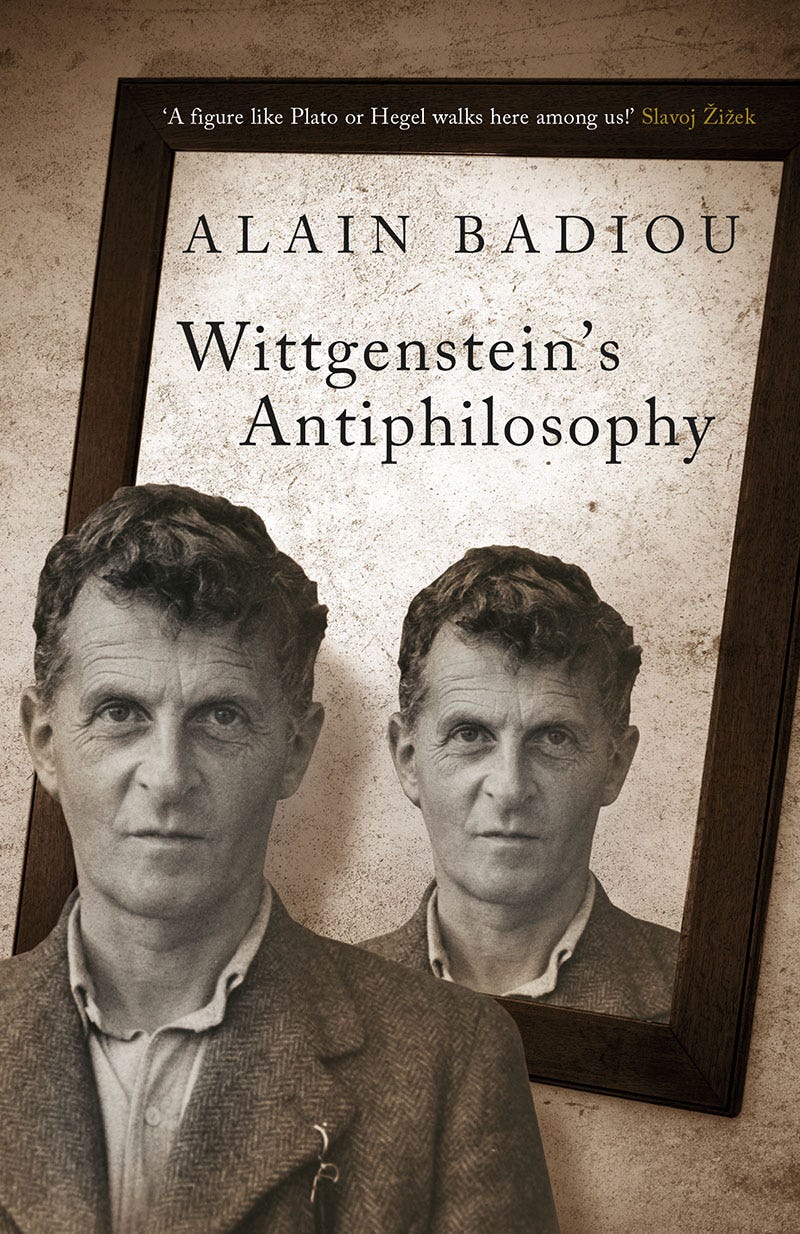
Not to be entirely one-sided and biased, it’s worth stating that some of the criticisms of philosophy from physicists have been worthwhile, apt, and… philosophical.
Indeed many philosophers have themselves claimed that philosophy is dead (if not in those precise words).
Why “dead”?
Again, it’s because some (i.e., not all!) philosophers haven’t kept up with physics and science generally. (As stated, however, it depends how the words “kept up with science” are read.)
Ontic structural realists are a clear example of this. (They too don’t have every philosopher under the sun in mind.)
And a few other philosophers (such as Daniel Dennett — see here) are also critical of philosophers for many of the same reasons cited by anti-philosophy physicists.
On a related theme.
One can understand how certain physicists are irked by philosophers if the American philosopher of physics, David Z. Albert, was correct when he stated (in the video cited above) the following:
“There have been instances of philosophers telling physicists that they’re not doing their jobs properly.”
That may explain why these anti-philosophy physicists get so pissed off by philosophers. At least David Albert’s words may offer us a partial explanation of that.
So now take on board the following passage (which is in tune with what Albert just said) from the philosopher of science, Wesley Salmon. He wrote:
“While the philosopher of science may be basically concerned with abstract logical relations, he can hardly afford to ignore the actual methods that scientists have found acceptable. If a philosopher expounds a theory of the logical structure of science according to which almost all of modern physical science is methodologically unsound, it would be far more reasonable to conclude that the philosophical reasoning had gone astray than to suppose that modern science is logically misconceived.”
The host of the previously-cited video debate also tells us that physicists claim that “philosophers don’t add any knowledge to the world”. That’s very ironic because it was philosophers themselves (e.g., the logical positivists and Ludwig Wittgenstein — see here) who first made precisely that point in the 1920s and 1930s.
Yet this also means that in order for physicists to claim that philosophy doesn’t add any knowledge to the world, then surely they must do some philosophising themselves. Among other things, anti-philosophy physicists must do the following:
1) Explain what they mean by the word “knowledge”.
2) Tell us why philosophical claims aren’t examples of knowledge.
3) Tell us why scientific knowledge is actually the only kind of knowledge.
4) And finally tell us why scientific knowledge (or science itself) must have such a preeminent status in society.
None of the positive or negative answers to those questions will be scientific in nature. And they certainly won’t be part of physics!
One would hope, then, that anti-philosophy physicists won’t argue that such questions shouldn’t even be asked.
However, if any physicists did argue (or simply believe) that these questions are a waste of time (i.e., precisely because they’re philosophical), then that extreme position would itself need to be philosophically defended and backed up. And if such scientists didn’t defend it (or if they believe that they aren’t required to defend it), then that stance will — again — need a philosophical defence.
Ironically, it can just as easily be said that much physics is dead because physicists haven’t kept up with philosophy.
History
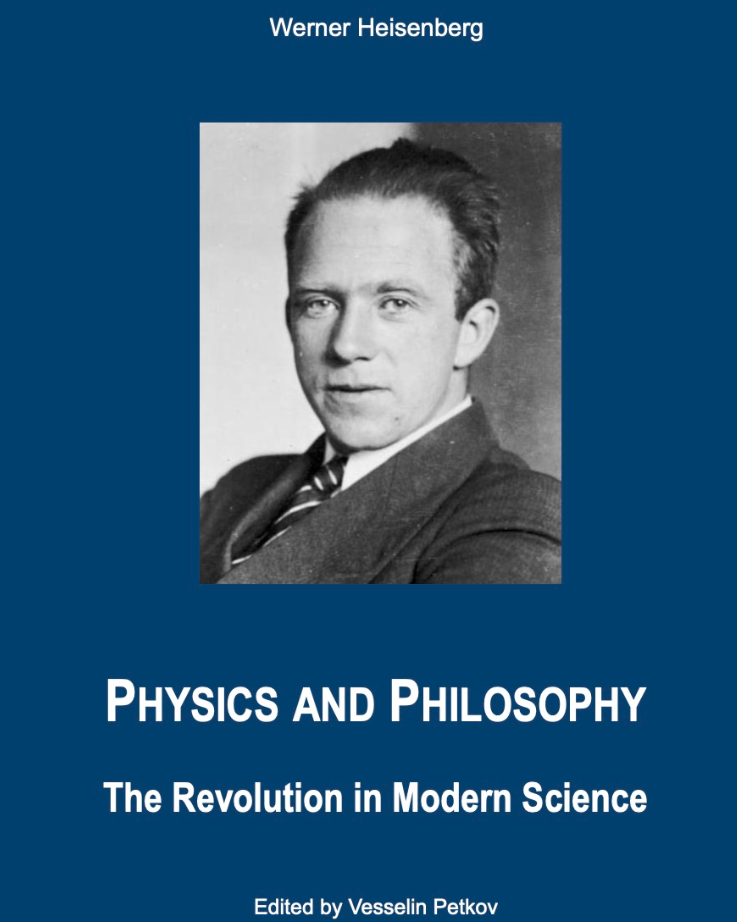
Historically, it was the case that nearly all scientific advances had their roots in philosophical ideas and theories. And as a consequence of that, it can now be said that the revolutionaries of physics have always been both philosophically inclined and aware of much philosophy.
So although there have indeed been critical remarks about philosophy from physicists, there haven’t been as many as some readers may think.
Albert Einstein, to take just one example, owed a strong debt to Ernst Mach, Immanuel Kant and Baruch Spinoza (as well as others). Even Isaac Newton was well-schooled in philosophy and his own physics was called (as is often pointed out) “natural philosophy”.
In terms of contemporary — as well as somewhat less recent — philosophical physicists and physicists who don’t diss philosophy (though they do, of course, diss particular philosophical positions or theories), we have Lee Smolin, Roger Penrose, Carlo Rovelli, Murray Gell-Mann, Sean Carroll, Brian Greene, Julian Barbour, Paul Davies, Freeman Dyson, John Wheeler, Martin Rees, Steven Weinberg, etc. But if we go back in history, there’ve been many other philosophical physicists (from Isaac Newton to Niels Bohr and Werner Heisenberg); many of whom were also very knowledgeable about philosophy.
One must also admit here that being a philosophical physicist doesn’t necessarily mean that such a physicist must also be a very-big fan of philosophy. They don’t need to, say, keep bang up-to-date with all the top academic philosophy journals.
In any case, many physicists have only ever mentioned dead philosophers (i.e., not contemporary ones). The American philosopher and journalist Jim Holt, for example, tells us that when the philosophy of science is brought to the attention of physicists, they always say: “Oh, you mean Karl Popper?”
So is that (at least partly) why these anti-philosophy physicists believe what they believe about philosophy? That is, perhaps they believe that philosophy of science = Karl Popper. Indeed was Popper himself an example of one of those philosophers who (to use Wesley Salmon’s words again) “ignore[d] the actual methods that scientists have found acceptable”?
As stated earlier, it’s very hard to say because most (or all) anti-philosophy physicists rarely cite any details about the philosophy they dislike or see as being “irrelevant”.
In addition, none of the above is to claim that the physical theories of these philosophical physicists were actual examples of philosophy.
Some critics of philosophy have been keen to point this out. Yet the statement that theories in physics aren’t themselves expressions of philosophy is a statement of the obvious.
In detail.
Critics of philosophy (i.e., not only physicists) have felt the need to point out to me the irrelevance of the “context of discovery”. One such critic cited Albert Einstein as an example of this.
He pointed out that Einstein loved playing the violin and that this hobby didn’t impact on his actual physics.
Sure!
But what about Einstein and philosophy?
As if Einstein’s philosophical positions and influences were equivalent to his playing the violin, drinking wine while theorising about physics or being a penniless member of the bourgeoisie.












No comments:
Post a Comment